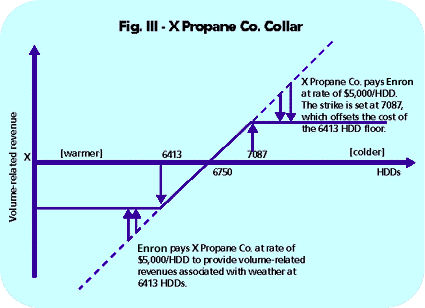 |
How a distributor uses a swap or collar to gain earnings stability
X Propane Co. distributes propane to residential customers in New Hampshire. The company is planning an expansion into a neighboring state, but creditors are concerned about earnings volatility, especially during the winter months of October to April. While cold winters create favorable sales conditions, mild winters depress volumes and can create cash-flow problems for the coming year. The company therefore requires the earnings stability available from mild winter protection. However, X Propane Co. would like the ability to benefit from colder conditions and avoid a premium payment.
Enron can provide X Propane Co. with earnings stability through a weather swap or a costless collar to achieve the aim of mild winter protection without a premium payment.
After studying the relationship between sales and historical weather conditions, X Propane Co. management determines that each HDD deviation from normal affects earnings by $5,000.
For the weather swap, analysis of historical weather conditions in the neighboring state results in an agreed strike of 6,750 HDDs for the October to April winter season. If the actual number of HDDs is 6,000 (the weather is milder than the strike), Enron would pay X Propane Co. $3,750,000 ($5,000 x [6,750 - 6,000]). This payment compensates the company for lost earnings caused by decreased sales. If, on the other hand, the number of HDDs is 7,100 (the weather is colder than the strike), X Propane Co. pays Enron $1,750,000. In this case the payment would likely be possible as a result of increased sales. The intended effect is that whatever the underlying weather conditions, mild or cold, X Propane Co. will achieve volume-related revenues associated with 6,750 HDDs.

Alternatively, Enron can provide mild-winter protection of $5,000 for every HDD below a level of 6,413 HDDs (5% below the swap level), the cost of which is offset by establishing a ceiling of 7,087, above which X Propane Co. pays Enron $5,000/HDD. The intended result is again earnings stability, albeit within a band. In exchange for limiting its potential upside, the company is protected against the weather being milder than the 6,413 strike, but can take advantage of increased revenues when the weather is colder.

 |





